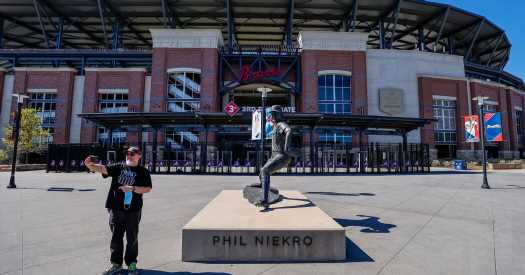Major League Baseball is reviewing its decision to hold this summer’s All-Star Game in Atlanta and other major sports entities have paused to reconsider where Georgia and other states fit into the national events ecosystem after Georgia’s passage of a sweeping law that restricts voting access.
M.L.B. is gathering feedback from teams and executives before coming to a decision on relocating the game, Commissioner Rob Manfred said this week in a wide-ranging interview with The Associated Press.
“I am talking to various constituencies within the game and I’m just not going beyond that in terms of what I would consider or not consider,” he said.
Tony Clark, the executive director of the M.L.B. Players Association, has said the union was willing to discuss pulling the game, scheduled for July 13.
That Atlanta is considered a birthplace of the civil rights movement and was the baseball home to the Hall of Famer Hank Aaron, who endured racism with grace and dignity en route to breaking Babe Ruth’s home run record, complicates the sport's calculus.
Georgia’s new law comes amid a national movement among Republican-controlled state legislatures fueled by false claims the 2020 election was stolen to mount the most extensive contraction of voting access in generations. In Georgia, the law introduced stricter identification requirements for absentee balloting, limited the use of drop boxes and expanded the Legislature’s power over elections.
The National Black Justice Coalition called for the PGA Tour and the Masters Tournament to pull next week’s major championship from Augusta National Golf Course. (The Masters is run not by the PGA Tour, but by the Augusta National Golf Club.) The civil rights organization is also asking PGA Tour players not to compete in Georgia until the voting law is repealed. The Women’s PGA Championship will be held in the Atlanta area in June.
“The PGA Tour and Masters Tournament have both made commitments to help diversify golf and address racial inequities in this country — and we expect them to not only speak out against Georgia’s new racist voter suppression law, but to also take action,” said David J. Johns, executive director of the organization, in a statement.
Representatives for the Masters did not return phone calls or email.
President Biden called the law in Georgia and others proposed across the country “Jim Crow on steroids,” and said he would support M.LB. moving the All-Star Game. He has noted the success that N.B.A. and W.N.B.A. players had in bringing attention to social justice issues after the police killing of George Floyd in May 2020.
Sports leagues have taken on state legislatures before: The N.B.A. moved the 2017 All-Star Game out of Charlotte, N.C., after a law was passed barring transgender people from using bathrooms in public buildings that do not correspond with the gender on their birth certificate. The law was later repealed and Charlotte hosted the All-Star Game in 2019.
In 1991, after Arizona refused to make Martin Luther King Jr. Day a paid holiday, N.F.L. owners voted to remove the 1993 Super Bowl from the state and instead held it in the Rose Bowl in California, costing the Phoenix area an estimated $200 million in Super Bowl-related revenue at the time.
This time, many sports entities have stayed quiet, with most statements coming after the law was signed amid activist pressure. The N.C.A.A., which has intervened in state political battles in the past, did not respond to a request for comment on Thursday. The Southeastern Conference, which hosts its annual football championship game in Atlanta, did not comment.
Other sports leagues and teams have decried the Georgia law, but have stopped short of taking punitive action.
“Any legislation that makes it harder for people to vote strikes at the very foundation of our democracy,” said Mark Tatum, the N.B.A. deputy commissioner. “The N.B.A. will continue to work alongside our partners and nonpartisan voting organizations to help ensure that voting is more accessible for every American regardless of party affiliation.”
Arthur Blank, the Atlanta Falcons owner and chairman, said “the right to vote is simply sacred.” He added in a statement: “We should be working to make voting easier, not harder for every eligible citizen.”
Christina Kim, an American golfer, said the Georgia law, and others like it, was certain to spark dialogue.
“There is such an importance in taking a moment, truly having conversations, not caring if it’s a red or blue state, representative, governor, mayor, person and just think about what the correct thing to do is,” Kim said.
Eric Reveno, an assistant men’s basketball coach at Georgia Tech who last year was the force behind the N.C.A.A. making federal Election Day a mandatory day off from athletic activities, was skeptical that moving events like basketball tournament games or football playoff games out of Georgia would have the desired effect.
“I worry it’s not a simple thing that a PR push can fix,” Reveno said. “I know there’s a lot of corporate pressure and the N.C.A.A. can do that. But that may be asking the N.C.A.A. to fix something that they can’t fix.”
Reveno said a grass-roots focus was more appropriate.
“If voting absentee is harder, voting by drop boxes is harder and there are less early voting dates, how can we help people vote? Politicly and legally, what’s the best way to make voter participation and opportunity broader and more egalitarian?”
Corporate sponsors will most likely play an important role in determining whether baseball’s All-Star Game, or any other major sporting events, will be moved or canceled in protest of laws limiting access to voting. But so far, M.L.B. sponsors have been mostly silent.
A spokeswoman for T-Mobile said in a statement that “we believe that every American should have the ability to freely exercise their right to vote.”
Mastercard and Budweiser declined to comment; Bank of America, Chevrolet, DraftKings, Gatorade, Geico, Google, MGM Resorts and Taco Bell did not respond to requests for interviews.
Still, after seeing how a coalition of prominent Black executives influenced corporations to speak out publicly against the law — among them Coca-Cola, which is headquartered in Georgia — voting rights activists have set their sights on the sporting world.
Cliff Albright, co-founder of the Black Voters Matter Fund, said activists “were a little too quiet early” and should have been more vocal before the law was passed.
Albright said he has reached out to More Than A Vote, the voting rights advocacy group led by a collective of athletes including LeBron James, for help fighting upcoming bills in states like Texas.
“At the bare minimum is what we want them to continue to use their platform to make statements and support,” he said.
Sopan Deb, Karen Crouse, Kevin Draper, James Wagner, Billy Witz and Alan Blinder contributed reporting.
Source: Read Full Article





